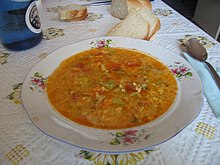Ciorbă: Difference between revisions
No edit summary Tags: Mobile edit Mobile app edit Android app edit |
merger proposal |
||
| Line 1: | Line 1: | ||
{{mergeto|Chorba|discuss=Talk:Chorba#Merger proposal}} |
|||
{{for|the surname|Ciorbă (surname)}} |
{{for|the surname|Ciorbă (surname)}} |
||
Revision as of 13:23, 28 February 2019
 A bowl of ciorbă | |
| Course | Entrée, Main course |
|---|---|
| Place of origin | Romania |
| Main ingredients | Water, vegetables, borș, spices |
| Variations | Made with meat, fish, or liver |
Ciorbă (Romanian pronunciation: [ˈt͡ʃʲorbə]), from Persian shorba (شوربا) via Turkish çorba is a general Romanian word used in Romania and the Republic of Moldova to describe sour soups consisting of various vegetables and meat. Most people differentiate between "supă" (soup) and "ciorbă" by the fact that supă has no added acid and is usually clear (with only one exception), while ciorbă may contain a wide variety of sour ingredients, usually lemons, borș, or zeamă de varză acră (sauerkraut juice). In Moldavia region, the word borș means simply any sour soup.[1] Lovage is a frequent addition.
Ciorbă is a widespread and popular dish in Romania, and is occasionally considered to have beneficial health effects.[2] When served hot it is thought to stimulate digestion and be effective against colds.[3]
In 2013 18 percent of respondents in a national poll in Romania declared ciorbă their favourite dish.[4]

Types of ciorbă include:
- Ciorbă de burtă (tripe soup)
- Ciorbă de rasol
- Ciorbă de fasole (bean soup)
- Ciorbă de cartofi (potato soup)
- Ciorbă de ciocănele (soup made from chicken legs)
- Ciorbă de perişoare (meatball soup)
- Ciorbă de peşte (fish soup)
- Ciorbă de praz (leek soup)
- Ciorbă de pui (chicken soup)
- Ciorbă de oase (bones soup)
- Ciorbă de sfeclă (Romanian borscht)
- Ciorbă de văcuţă (beef soup)
- Borş de burechiuşe
See also
References
- ^ "Teorii de istorie culinară care ne dezamăgesc: borşul şi mujdeiul, singurele alimente cu adevărat româneşti. Micii inventaţi de Cocoşatu' – un mit urban". Adevarul.ro. Retrieved 25 November 2018.
- ^ "Supa şi ciorba: scurtă istorie". Historia.ro. Retrieved 25 November 2018.
- ^ "Ce ciorbă preferă să mănânce românii". A1.ro. Retrieved 25 November 2018.
- ^ "Ce obiceiuri alimentare au romanii - sondaj IRES". Ziare.com. Retrieved 25 November 2018.
